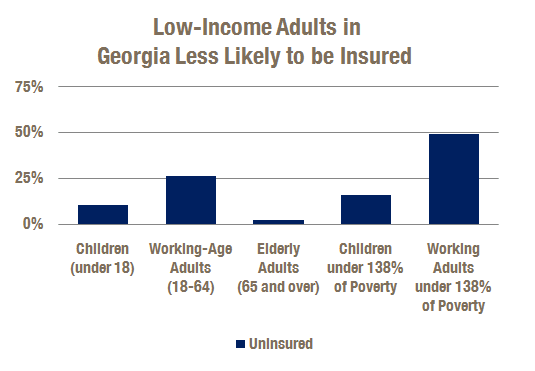The Medicaid expansion created by the Affordable Care Act is the most cost-effective way for Georgia to ensure that hundreds of thousands of low-income Georgians can finally get health coverage. Furthermore, it will carry a variety of other benefits for Georgia’s economy that policy makers should keep in mind as they weigh whether to participate.

Nearly 2 million Georgians, 19.6 percent of the state’s population, lack health insurance, the fifth-highest rate in the U.S. The problem is particularly severe for low-income adults. Low-income working-age Georgians (18-64 years old) are much less likely to have coverage than children or the elderly (see chart), and a key reason is their lack of access to Medicaid and Medicare.
The Affordable Care Act takes direct aim at the problem by expanding Medicaid eligibility to all Americans with incomes of about $15,000 a year for an individual and about $26,000 a year for a family of three, or up to 138 percent of the federal poverty level. The law provides federal funds to cover 100 percent of the costs for newly eligible patients for the first three years of the expansion (2014-2016), and at least 90 percent after that.
This will make for a healthier, more productive workforce as hundreds of thousands of Georgians gain access to preventive care as well as routine treatment for chronic conditions. A recent study in Oregon indicated there will be other financial benefits; it found Medicaid patients are less likely to have to borrow money to pay medical bills or to leave those bills unpaid, compared to those without insurance.
The federal money for the Medicaid expansion will flow directly to health care providers throughout Georgia, providing a significant boost to the state’s economy. In the first three years alone, the expansion could bring $7 billion or more to Georgia. Hospitals and doctors will get an additional boost since they will no longer have to cover the cost of so many patients without insurance who are unable to pay their bills. That is likely to benefit privately insured Georgians, since the costs of unpaid bills are now routinely shifted to others who can pay.
Some state leaders say that Georgia should decline to expand Medicaid. But with the benefits so clearly outweighing the costs, this is shortsighted. The state should instead prepare to implement the expansion in January 2014 to make sure Georgia is not left behind.








